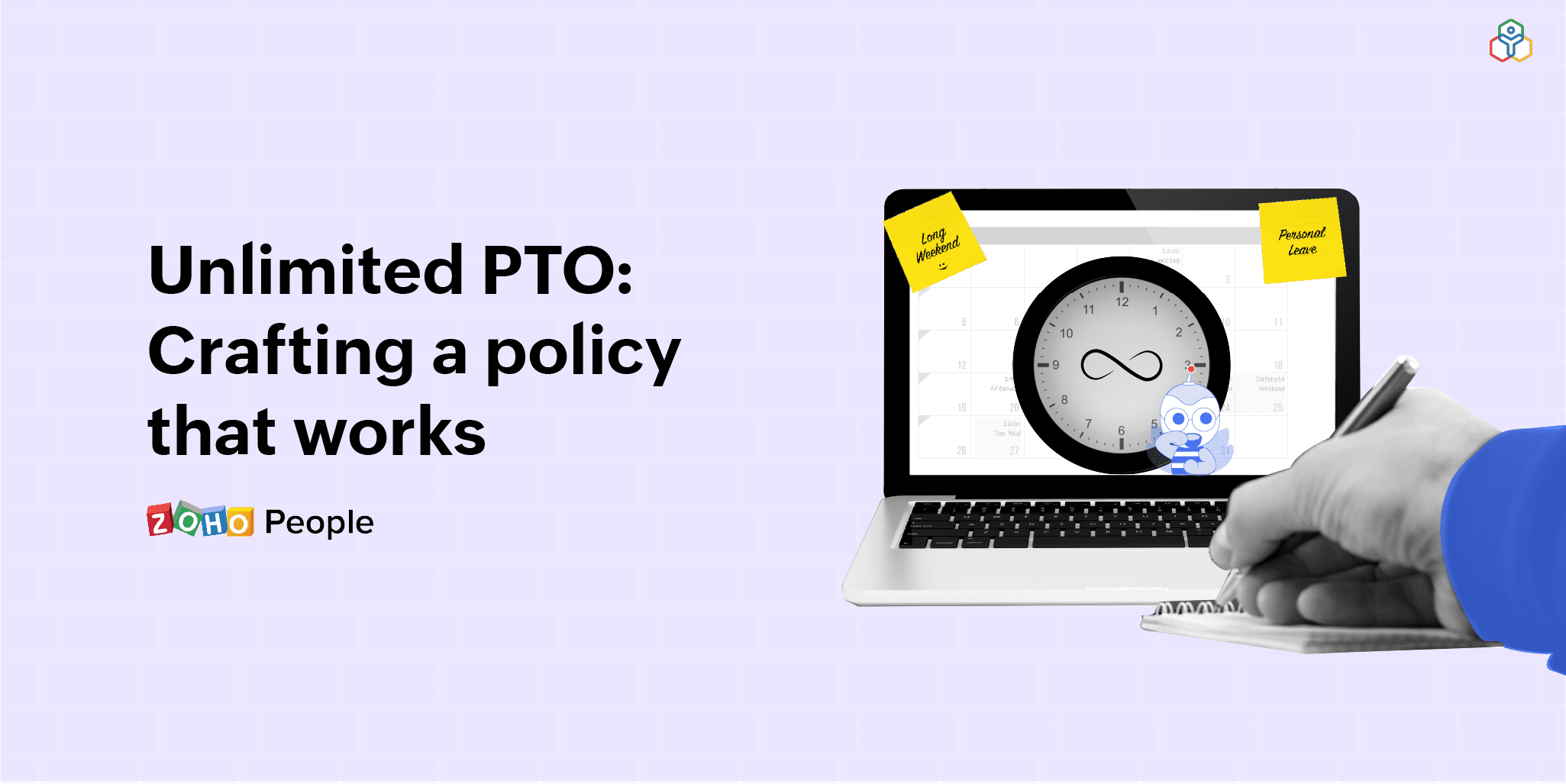- HOME
- HR insights
- Everything you need to know about an unlimited paid time off policy
Everything you need to know about an unlimited paid time off policy
- Last Updated : August 23, 2023
- 5.0K Views
- 5 Min Read

Employees these days want to work for organizations that make flexibility an innate part of their people management practices. According to a survey from Statista, about 58% of the respondents felt that flexible working improved their job satisfaction. As a result, more organizations are introducing flexible workplace practices to attract and retain top talent. One of these is unlimited paid time off (PTO).
If warning bells are sounding in your head when you see the word "unlimited," you aren't alone. Many organizations are trying to figure out the best way to implement an unlimited paid time off policy that promotes flexibility and empowers employees, but also maintains accountability. In this article, we explore the basics of an unlimited PTO policy along with its pros, cons, and what to consider before implementation.
What do we mean by "unlimited"?
As the name suggests, unlimited paid time off provides employees with the flexibility to take paid time off whenever they need to. Unlike traditional PTO policies, there's no hard limit on the number of days or hours that employees can take off as long as their work is completed.
What are the benefits of unlimited paid time off?
Many of us have been in a scenario where the end of the year is coming up, and we are stressing about how many days off we have left. An unlimited paid time off policy aims to resolve this issue by giving employees greater autonomy and allowing them to take time off without worry or guilt. When your workers aren't forced to be picky about how they allocate their personal and professional time, their work-life balance improves. Not to mention that when they come back to work from their time off, they tend to feel more refreshed and produce better work.
An unlimited PTO policy won't completely stop burnout, but it will allow employees to be more honest about when they need to take time away to destress. Furthermore, unlimited PTO tells employees that you value and respect them. They will understand that this is a sign of your trust that they will use their time off wisely, at their discretion. The employee-centric nature of an unlimited PTO policy goes a long way towards positively impacting how candidates and customers perceive your organization.
What are the drawbacks to unlimited paid time off?
An unlimited paid time off policy could lead to a potential overuse or underuse of time off days by your employees. Both can have a hugely negative impact on your organization and employees if left unchecked. For example, if some of your employees overuse their time off, their teams' productivity can take a huge hit and affect your bottom line. Decisions that depend on those employees may be delayed and affect work in other departments. The burden to complete these tasks then falls to the employees who are present, leading to higher rates of workplace stress and turnover.
On the other hand, when there's no limit on the number of days employees can take off, some may actually take much less than they should. They may feel unsure of how to request time off without a limit policy in place, or perhaps they are simply too engaged in their work to realize how long it's been since they took time away. Either way, underuse of an unlimited PTP policy can cause severe burnout and other health issues that will get in the way of your organization's productivity and growth.
Considerations before implementing unlimited paid time off
An unlimited PTO policy can be beneficial to your organization, but it's important that you establish a streamlined approach for it. Here are three things to consider:
1) An unlimited PTO policy should be clearly outlined to all employees.
To ensure that all employees are fully aware of how the policy works and how to request time off, create a handbook that covers the policy's rules and your organization's expectations. It can address the following questions: How should employees apply for time off? Is there a minimum number of days off that employees should take? Are you going to track the number of PTO days that employees avail? The policy should address what is acceptable and what is not.
2) Systems should be in place for handling the work of employees who are taking time off.
Discuss with team managers and decide on how to manage the work of employees who are taking an extended time off from work. Are you going to ask the employee going on leave to complete some of the high-priority tasks or are you going to ask someone else to cover for them? It's important to make sure that you have enough resources to complete any pending tasks and keep the work going before implementing an unlimited PTO policy.
3) Consequences of policy misuse should be decided and communicated.
Decide on how you are going to manage employees who misuse the unlimited PTO policy. Are you going to let them take as many leaves as they want as long as they complete what is expected from them? Will you have flexible boundaries or simply rely on managers to talk to team members that seems to be taking too little or too much time off? At the end of the day, the success of the policy will depend on how the overall culture of your organization promotes transparency, trust, and accountability.
Wrapping Up
An unlimited paid time off policy, when implemented carefully, can take your organization's people management strategies to the next level. As employees have the freedom to take leave whenever they need to, they can have a greater work-life balance. This, combined with the trust that the policy will foster among your employees, will boost productivity, motivation, and engagement among your teams in the long run. We hope this blog gave you insight into how an unlimited PTO policy works as well as a few basic measures to take before implementing one.
Also Read:Everything you need to know about Paid Time Off
 Tarika
TarikaContent Specialist at Zoho People


